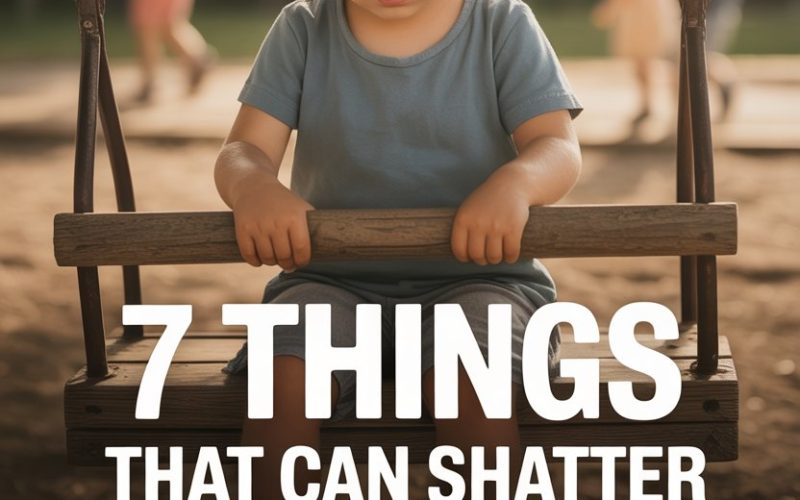Raising kids is a bit like assembling IKEA furniture: the instructions are vague, a few screws always seem missing, and you’re never quite sure if it’ll hold together.
But one thing’s certain—confidence matters.
Children aren’t born with self-belief; it’s built, wobbly and wonderful, on the scaffolding parents provide.
Want to avoid those sneaky confidence crushers hiding in plain sight? Let’s get straight to it.
1. Constant Criticism
No child has ever blossomed under an endless drizzle of negativity.
Pointing out every mistake (especially with a sigh and heavy eye roll) doesn’t lead to self-improvement. It just chips away at the “I can do it!” spirit.
Research from Harvard University shows that kids who feel criticised at home are less likely to take on new challenges.
When every spilled drink or wonky drawing is greeted with a tut and correction, kids start to believe their best isn’t good enough.
Swap the magnifying glass for a pair of rose-coloured specs once in a while. Notice the effort, not just the outcome.
“You tried really hard to keep the milk in the cup—next time, let’s see if we can get even more milk in the cup than on the table!” Far more motivating than “Honestly, can you not just hold it straight?!”
2. Comparing to Others
Nothing torpedoes confidence quite like hearing, “Why can’t you be more like your sister?”
Kids are expert comparison-makers already—just try serving two unequally sized slices of cake. They don’t need us adding fuel to that fire.
According to parenting experts, comparison breeds sibling rivalry and self-doubt.
Even comparisons that seem harmless—“Look how quickly your brother ties his shoes!”—can sting.
Every child has strengths and quirks, and those differences are what make family life colourful (and occasionally exhausting). Celebrate unique victories.
Maybe your daughter’s a maths whiz, and your son can remember every dinosaur name since the Triassic. Both skills are worthy of applause—and dinosaur trivia is surprisingly handy at parties.
3. Overprotectiveness
Parental instinct hovers somewhere between “Do it yourself, darling” and “Let me wrap you in bubble wrap until you’re thirty.”
Err too far on the side of protection, and kids never get the chance to discover what they can actually do.
According to raisingchildren.net.au, children need opportunities to take reasonable risks and solve problems solo.
Helicopter parenting (complete with a megaphone for reminders) sends the message: “You can’t handle this on your own.”
Next time your child wants to climb that slightly-too-high playground ladder, breathe deep.
Offer a spot, not a swooping rescue. Let them try, fail, and try again. Scraped knees heal; confidence gained from perseverance sticks around much longer.
4. Ignoring or Dismissing Feelings
Kids have big emotions—sometimes several at once, plus a side order of drama for good measure.
When adults wave away those feelings (“Don’t be silly, it’s just a spider!”), children learn that their inner world isn’t worth much.
The American Academy of Pediatrics emphasizes the importance of validating children’s emotions.
When a parent acknowledges, “That spider scared you, didn’t it?”, kids feel seen and heard. Dismissing, on the other hand, can leave them doubting their own judgment.
Empathy is the magic ingredient. It doesn’t mean agreeing that the spider is plotting world domination, just that you understand it’s scary for them.
Try saying, “It’s okay to feel nervous. I’ll be right here while you get brave.” Bonus points for not shrieking louder than your child.
5. Setting Unrealistic Expectations
Setting the bar so high that only an Olympic pole vaulter could clear it means children quickly learn: why try?
Kids crave approval, but not at the cost of constant anxiety over impossible standards.
According to Dr. Carol Dweck’s research on growth mindset, unrealistic expectations can push kids toward a fear of failure. Instead of aiming for “top of the class or bust,” focus on progress.
Celebrate the small wins, like remembering to pack their own bag or reading a tricky page without help.
Perfection is for robots and overly ambitious sourdough enthusiasts. Kids? They’re gloriously imperfect.
Encourage effort, persistence, and a good laugh at the inevitable wobbly attempts.
6. Withholding Praise or Affection
Ever heard the phrase, “Don’t spoil them with too much praise”? Turns out, praise is less like chocolate and more like vegetables—you can’t really overdo it, as long as it’s genuine.
A 2017 meta-analysis in the journal Child Development found that authentic praise strengthens a child’s self-esteem. Kids thrive on knowing that their efforts (not just their results) matter to someone.
Save the standing ovation for when they finally put their socks in the laundry basket, but sprinkle encouragement liberally: “I love how you stuck with that puzzle, even when it got tough!”
Don’t leave affection to chance—hugs and high fives are the glue that holds confidence together.
7. Public Shaming and Humiliation
Few things sting worse than being embarrassed in front of others.
Whether it’s a sarcastic remark at the family dinner table or sharing a child’s blunder on social media (please, just no), public humiliation scars confidence in ways that linger.
A research on Harvard Medical School warn that shaming tactics can lead to anxiety, withdrawal, and a deep reluctance to try new things for fear of “messing up again.”
Even the “funny stories” told at parties can make children feel like the punchline.
Discipline is necessary, but privacy is sacred. Discuss mistakes one-on-one, and frame them as opportunities to learn, not as fodder for family entertainment.
Every child deserves to feel safe—even when they’ve just smeared toothpaste over the dog.
Raising Braver Kids, One Day at a Time
Confidence isn’t forged overnight, and there’s no secret recipe (though bribery with a biscuit helps at times). Every parent trips up—sometimes daily.
The good news? Kids are resilient, especially when they know home is a place of kindness, understanding, and second chances.
Next time you catch yourself about to compare, criticise, or step in too quickly, pause. Offer a smile, a nod, or even just a “You’ve got this.”
It might be the very thing that helps your child stand a little taller—not just this week, but for years to come.




